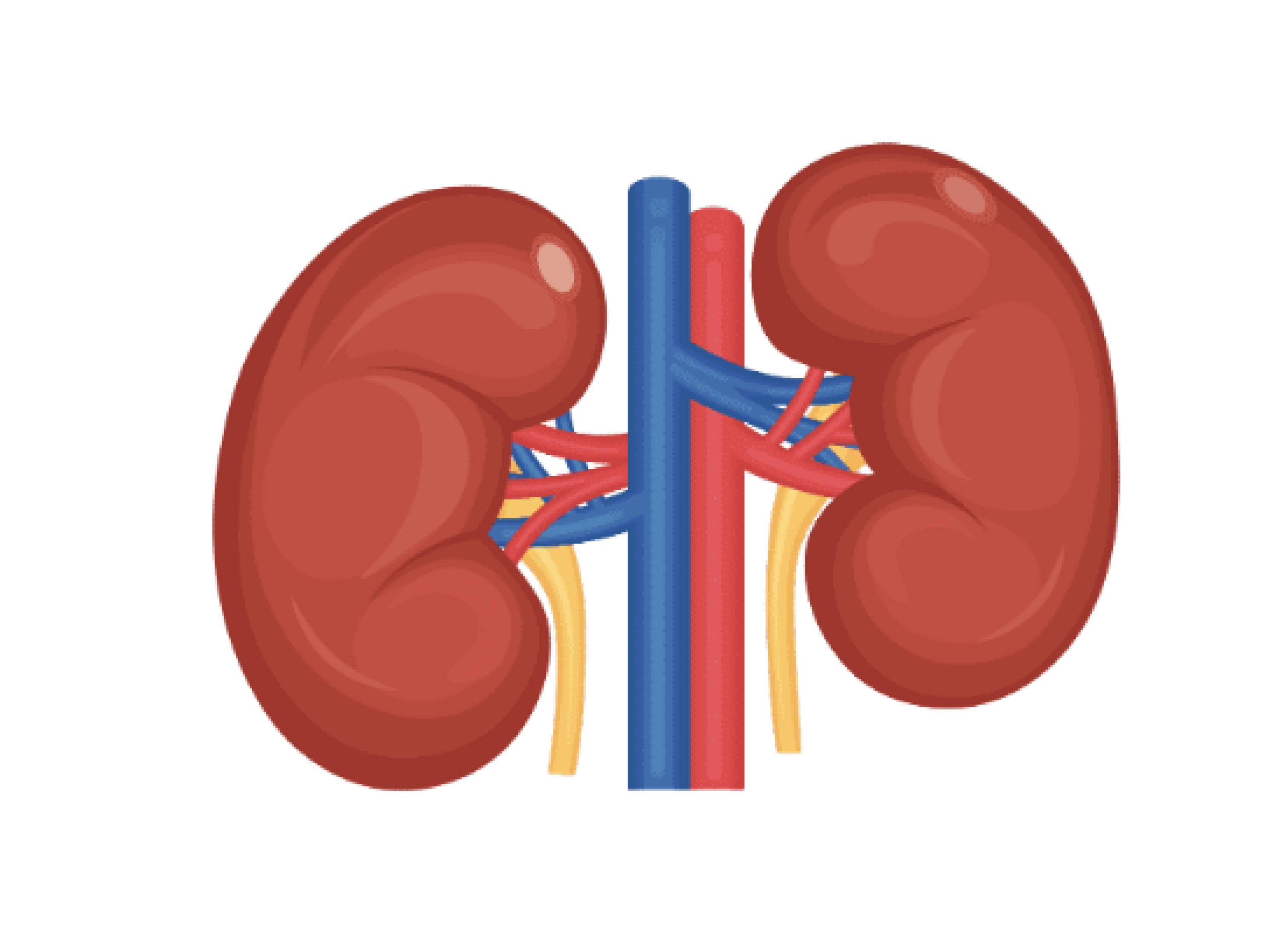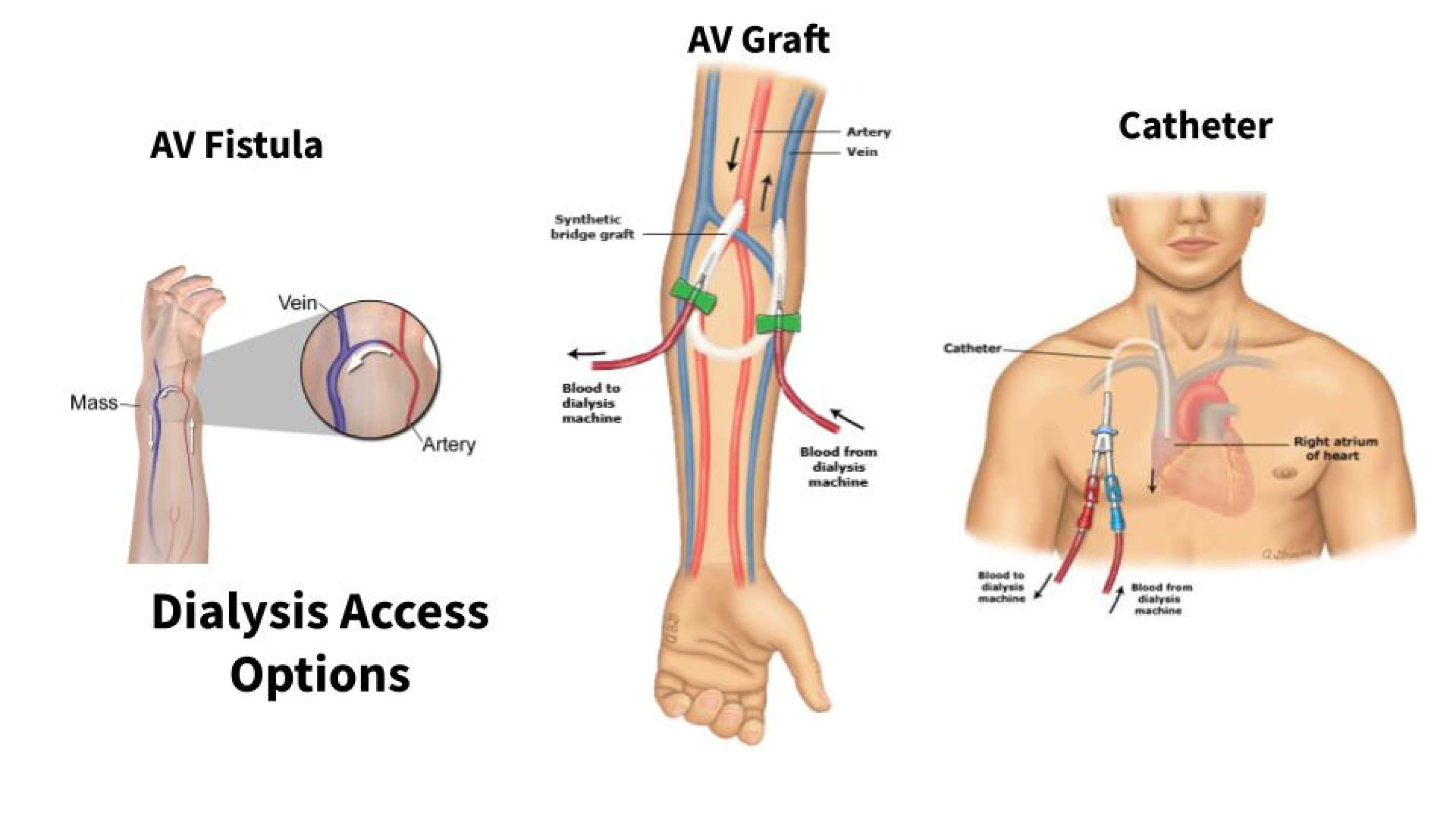End Stage Renal Disease
More than 1 in 7 Adults in the United States have Chronic Kidney Disease

Risk Factors
Many controllable lifestyle choices and other conditions contribute to loss of kidney function.
- Diabetes
- High blood pressure
- Heart disease
- Drug abuse
- Blockages in the urinary tract
- Family history
- Inflammation
- Injury
- Some genetic disorders
Symptoms
Kidneys perform the critical function of filtering wastes and extra fluid from our bodies. Kidney disease occurs in stages, with the most severe—end-stage renal disease--occurring when the kidneys are reduced to less than 15% of their optimal function. In earlier stages, noticeable symptoms may not occur, but as the disease progresses, worsening symptoms related to fluid and toxic waste build up occur:
- Nausea
- Vomiting
- Loss of appetite.
- Fatigue and weakness
- Changes in urination
- If fluid builds up around the lining of the heart, chest pain may occur
- If fluid builds up in the lungs, shortness of breath may occur
- Decreased mental acuity
- Swelling of feet and ankles
- Difficulty falling asleep
Diagnosis
Kidney disease is mainly diagnosed after your physician orders and analyzes a blood test that assesses your Glomerular Filtration Rate (GFR), which is the rate at which kidneys filter out fluid and wastes. The lower your GFR, the more severe your kidney disease. Several other tests can be done as well:
Urine tests: can be ordered to assess level of albumin protein in urine
Imaging tests: MRIs, CTs, or ultrasounds can be done to find abnormalities in the kidneys
Kidney biopsy: a sample of your kidney may be taken to assess what kind of kidney disease a you have and how severe it is
Treatment
The treatment for kidney disease, especially that which has progressed to later stages, is hemodialysis, whereby a dialysis machine takes over the kidneys and performs the function of filtering waste and excess fluids. In order to do so, the dialysis machine must be attached to the bloodstream in a manner where high blood flow rates can be achieved. This can be achieved through three different treatment options. At BEVSA, our surgeons perform three procedures to enable successful dialysis access for our patients with end-stage renal disease:

Under the skin
- Arteriovenous (AV) Fistula Creation: The word fistula means connection; hence, arterio (artery) + venous (vein) fistula is a connection between an artery and vein. During the procedure, your surgeon will connect an artery in your arm to a vein in your arm. This creates a small channel of blood flow that can be easily accessible by needles for dialysis.
- During the procedure:
- During the fistula creation procedure, you will either receive general, during which you will be asleep, or local anaesthesia, during which you are awake but your arm is numb.
- A small incision will be made in your arm so your surgeon can access your blood vessels
- Your surgeon will then connect the selected artery and vein surgically with sutures, then close the incision with stitches
- Though it will take a few weeks for your surgical site and fistula to fully heal, you can resume normal activities within two weeks as long as you take proper precautions
- Post-op care:
- Wash the access site every day and keep it clean and dry
- Be careful not to bump or injure the access site
- Do not place a blood pressure cuff, tight clothing, or jewelry over access site
- Avoid placing weight on arm with access site
- Tell your doctor if you see any infection signs (redness, swelling, pus)
- During the procedure:
- Arteriovenous Graft Placement: Instead of directly connecting the selected artery and vein, your surgeon will use a graft to connect them; a graft known as an arteriovenous (AV) graft can be placed in the arm to connect an artery and vein using an artificial tube.
- During the procedure
- If your veins are too small to for an AV fistula, your surgeon will likely choose to sew a graft in between the vein and artery to connect the two.
- During the graft placement procedure, you will either receive general, during which you will be asleep, or local anaesthesia, during which you are awake but your arm is numb.
- A small incision will be made in your arm, then your surgeon will sew the graft into the selected artery
- The graft will be looped just under the skin, then sewn into the selected vein
- During your hemodialysis treatment, needles will be placed into the graft in order to access the blood flowing from the artery to the vein
- Post-op care:
- Your arm should be kept elevated following the procedure until discomfort abates
- Only take showers after the graft and incision are healed, but be sure to wash the site gently with warm water and soap each day
- Be careful not to bump or injure the access site
- Do not place a blood pressure cuff, tight clothing, or jewelry over access site
- Avoid placing weight on arm with access site
- Keep the site clean and dry
- Tell your doctor if you see any infection signs (redness, swelling, pus)
- During the procedure
Not covered by skin
- Catheter Placement: A venous catheter can be placed in your neck, chest, or leg. Most patients have their catheter placed in the chest and it is usually placed a few weeks before dialysis treatment starts. Catheters are not generally the first choice, as having a tube that hangs out of one's body introduces considerable risk of infection; however, they are used if patients only require dialysis for a short term, or if they need dialysis treatment urgently and their AV Fistula or AV Graft is still healing.
- During the procedure:
- During the catheter placement procedure, you will receive local anaesthesia, during which you are awake but your arm is numb, and a sedative to help you relax.
- A small incision will be made in the lower part of your neck, which is usually where the catheter is place.
- Through the incision, your surgeon will access your jugular vein with a needle, and thread a small guidewire into the vein, where it will then be passed to the vena cava, a major vein that leads back to the heart
- Your surgeon will then make a second incision below the first one, and a tunnel will be made beneath your skin, through which the dialysis catheter will be passed through
- The guidewire is then removed, and your catheter will be in it's final position, coming through the second incision outside of your body
- Post-op care:
- Avoid heavy lifting or exercise
- The exit site--the second incision where the catheter comes out of--should heal in 4-6 weeks
- Keep the catheter entry and exit sites clean, dry, and dressed
- Do not shower or bathe
- During the procedure:
After your surgeon performs one of the above procedures and the access is in place, patients can undergo hemodialysis, where the dialysis machine takes blood from the patient’s body and filters out toxins and excess fluid, then returns clean blood back to the body. Depending on your dialysis access, you may require subsequent revisions to ensure that your access is functioning properly for dialysis.
Dialysis Access Type Pros and Cons
Each type of dialysis access used for hemodialysis treatment of end stage renal disease has its pros and cons.
- AV Fistula
- Pros
- considered best vascular access
- less infection risk compared to other access types
- can last many years
- allows for fast blood flow (necessary for dialysis) and efficient blood cleaning during dialysis
- Cons
- visible under skin on forearm
- can take weeks to months to heal and develop
- AVF placement requires long term planning--to care for arm and schedule surgery in advance of when dialysis treatment needs to be started
- need to watch for bleeding when needles are placed and removed
- may require an additional access type while it heals
- some fistulas don't successfully develop
- Pros
- AV Graft
- Pros
- can be easily placed
- predictable success
- can be used sooner than AV Fistula (days to weeks)
- Graft can be converted into an AVF if it stops working
- Cons
- increased risk of clotting
- increased risk of infection
- Does not last as long as AV fistula
- survival of patients with graft is lower than those that have AV fistula as their dialysis access
- Pros
- Catheters
- Pros
- dialysis can be performed immediately
- easily inserted
- can be removed and replaced
- do not need needle stuck in arm for dialysis
- Cons
- not ideal in the long term
- high infection rates
- may not provide optimal or necessary blood flow for dialysis
- may cause narrowed veins, which can prevent AVF or grafts from being an option in the future
- swimming and baths cannot be taken with a catheter
- Pros